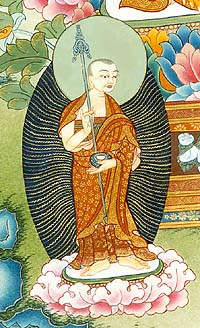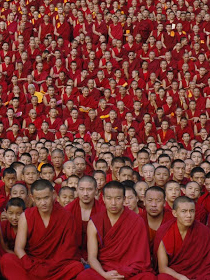- Home
- FPMT Homepage
Foundation for the Preservation of the Mahayana Tradition
The FPMT is an organization devoted to preserving and spreading Mahayana Buddhism worldwide by creating opportunities to listen, reflect, meditate, practice and actualize the unmistaken teachings of the Buddha and based on that experience spreading the Dharma to sentient beings. We provide integrated education through which people’s minds and hearts can be transformed into their highest potential for the benefit of others, inspired by an attitude of universal responsibility and service. We are committed to creating harmonious environments and helping all beings develop their full potential of infinite wisdom and compassion. Our organization is based on the Buddhist tradition of Lama Tsongkhapa of Tibet as taught to us by our founders Lama Thubten Yeshe and Lama Thubten Zopa Rinpoche.
- Willkommen
Die Stiftung zur Erhaltung der Mahayana Tradition (FPMT) ist eine Organisation, die sich weltweit für die Erhaltung und Verbreitung des Mahayana-Buddhismus einsetzt, indem sie Möglichkeiten schafft, den makellosen Lehren des Buddha zuzuhören, über sie zur reflektieren und zu meditieren und auf der Grundlage dieser Erfahrung das Dharma unter den Lebewesen zu verbreiten.
Wir bieten integrierte Schulungswege an, durch denen der Geist und das Herz der Menschen in ihr höchstes Potential verwandelt werden zum Wohl der anderen – inspiriert durch eine Haltung der universellen Verantwortung und dem Wunsch zu dienen. Wir haben uns verpflichtet, harmonische Umgebungen zu schaffen und allen Wesen zu helfen, ihr volles Potenzial unendlicher Weisheit und grenzenlosen Mitgefühls zu verwirklichen.
Unsere Organisation basiert auf der buddhistischen Tradition von Lama Tsongkhapa von Tibet, so wie sie uns von unseren Gründern Lama Thubten Yeshe und Lama Thubten Zopa Rinpoche gelehrt wird.
- Bienvenidos
La Fundación para la preservación de la tradición Mahayana (FPMT) es una organización que se dedica a preservar y difundir el budismo Mahayana en todo el mundo, creando oportunidades para escuchar, reflexionar, meditar, practicar y actualizar las enseñanzas inconfundibles de Buda y en base a esa experiencia difundir el Dharma a los seres.
Proporcionamos una educación integrada a través de la cual las mentes y los corazones de las personas se pueden transformar en su mayor potencial para el beneficio de los demás, inspirados por una actitud de responsabilidad y servicio universales. Estamos comprometidos a crear ambientes armoniosos y ayudar a todos los seres a desarrollar todo su potencial de infinita sabiduría y compasión.
Nuestra organización se basa en la tradición budista de Lama Tsongkhapa del Tíbet como nos lo enseñaron nuestros fundadores Lama Thubten Yeshe y Lama Zopa Rinpoche.
A continuación puede ver una lista de los centros y sus páginas web en su lengua preferida.
- Bienvenue
L’organisation de la FPMT a pour vocation la préservation et la diffusion du bouddhisme du mahayana dans le monde entier. Elle offre l’opportunité d’écouter, de réfléchir, de méditer, de pratiquer et de réaliser les enseignements excellents du Bouddha, pour ensuite transmettre le Dharma à tous les êtres. Nous proposons une formation intégrée grâce à laquelle le cœur et l’esprit de chacun peuvent accomplir leur potentiel le plus élevé pour le bien d’autrui, inspirés par le sens du service et une responsabilité universelle. Nous nous engageons à créer un environnement harmonieux et à aider tous les êtres à épanouir leur potentiel illimité de compassion et de sagesse. Notre organisation s’appuie sur la tradition guéloukpa de Lama Tsongkhapa du Tibet, telle qu’elle a été enseignée par nos fondateurs Lama Thoubtèn Yéshé et Lama Zopa Rinpoché.
Visitez le site de notre Editions Mahayana pour les traductions, conseils et nouvelles du Bureau international en français.
Voici une liste de centres et de leurs sites dans votre langue préférée
- Benvenuto
L’FPMT è un organizzazione il cui scopo è preservare e diffondere il Buddhismo Mahayana nel mondo, creando occasioni di ascolto, riflessione, meditazione e pratica dei perfetti insegnamenti del Buddha, al fine di attualizzare e diffondere il Dharma fra tutti gli esseri senzienti.
Offriamo un’educazione integrata, che può trasformare la mente e i cuori delle persone nel loro massimo potenziale, per il beneficio di tutti gli esseri, ispirati da un’attitudine di responsabilità universale e di servizio.
Il nostro obiettivo è quello di creare contesti armoniosi e aiutare tutti gli esseri a sviluppare in modo completo le proprie potenzialità di infinita saggezza e compassione.
La nostra organizzazione si basa sulla tradizione buddhista di Lama Tsongkhapa del Tibet, così come ci è stata insegnata dai nostri fondatori Lama Thubten Yeshe e Lama Zopa Rinpoche.
Di seguito potete trovare un elenco dei centri e dei loro siti nella lingua da voi prescelta.
- 欢迎 / 歡迎
简体中文
“护持大乘法脉基金会”( 英文简称:FPMT。全名:Foundation for the Preservation of the Mahayana Tradition) 是一个致力于护持和弘扬大乘佛法的国际佛教组织。我们提供听闻,思维,禅修,修行和实证佛陀无误教法的机会,以便让一切众生都能够享受佛法的指引和滋润。
我们全力创造和谐融洽的环境, 为人们提供解行并重的完整佛法教育,以便启发内在的环宇悲心及责任心,并开发内心所蕴藏的巨大潜能 — 无限的智慧与悲心 — 以便利益和服务一切有情。
FPMT的创办人是图腾耶喜喇嘛和喇嘛梭巴仁波切。我们所修习的是由两位上师所教导的,西藏喀巴大师的佛法传承。
繁體中文
護持大乘法脈基金會”( 英文簡稱:FPMT。全名:Found
ation for the Preservation of the Mahayana Tradition ) 是一個致力於護持和弘揚大乘佛法的國際佛教組織。我們提供聽聞, 思維,禪修,修行和實證佛陀無誤教法的機會,以便讓一切眾生都能 夠享受佛法的指引和滋潤。 我們全力創造和諧融洽的環境,
為人們提供解行並重的完整佛法教育,以便啟發內在的環宇悲心及責 任心,並開發內心所蘊藏的巨大潛能 — 無限的智慧與悲心 – – 以便利益和服務一切有情。 FPMT的創辦人是圖騰耶喜喇嘛和喇嘛梭巴仁波切。
我們所修習的是由兩位上師所教導的,西藏喀巴大師的佛法傳承。 察看道场信息:
- FPMT Homepage
- News/Media
-
- Study & Practice
-
-
- About FPMT Education Services
- Latest News
- Programs
- New to Buddhism?
- Buddhist Mind Science: Activating Your Potential
- Heart Advice for Death and Dying
- Discovering Buddhism
- Living in the Path
- Exploring Buddhism
- FPMT Basic Program
- FPMT Masters Program
- FPMT In-Depth Meditation Training
- Maitripa College
- Lotsawa Rinchen Zangpo Translator Program
- Universal Education for Compassion & Wisdom
- Online Learning Center
-
- Prayers & Practice Materials
- Overview of Prayers & Practices
- Full Catalogue of Prayers & Practice Materials
- Explore Popular Topics
- Benefiting Animals
- Chenrezig Resources
- Death & Dying Resources
- Lama Chopa (Guru Puja)
- Lama Zopa Rinpoche: Compendium of Precious Instructions
- Lama Zopa Rinpoche: Life Practice Advice
- Lama Zopa Rinpoche Practice Series
- Lamrim Resources
- Mantras
- Prayer Book Updates
- Purification Practices
- Sutras
- Thought Transformation (Lojong)
- Audio Materials
- Dharma Dates - Tibetan Calendar
- Translation Services
- Publishing Services
- Ways to Offer Support
- Prayers & Practice Materials
-
- Teachings and Advice
- Find Teachings and Advice
- Lama Zopa Rinpoche Advice Page
- Lama Zopa Rinpoche: Compendium of Precious Instructions
- Lama Zopa Rinpoche Video Teachings
- ༧སྐྱབས་རྗེ་བཟོད་པ་རིན་པོ་ཆེ་མཆོག་ནས་སྩལ་བའི་བཀའ་སློབ་བརྙན་འཕྲིན།
- Podcasts
- Lama Yeshe Wisdom Archive
- Buddhism FAQ
- Dharma for Young People
- Resources on Holy Objects
- Teachings and Advice
-
-
*If a menu item has a submenu clicking once will expand the menu clicking twice will open the page.
-
-
- Centers
-
- Teachers
-
- Projects
-
-
-
-
*If a menu item has a submenu clicking once will expand the menu clicking twice will open the page.
-
-
- FPMT
-
-
-
-
-
We can transform any problem, even death, into happiness. The point is not to stop the experience of problems but to stop the conditions that we call ‘problems’ from disturbing our mind, and instead use them to support the spiritual path that we practice.
Lama Zopa Rinpoche
-
-
-
- Shop
-
-
-
The Foundation Store is FPMT’s online shop and features a vast selection of Buddhist study and practice materials written or recommended by our lineage gurus. These items include homestudy programs, prayers and practices in PDF or eBook format, materials for children, and other resources to support practitioners.
Items displayed in the shop are made available for Dharma practice and educational purposes, and never for the purpose of profiting from their sale. Please read FPMT Foundation Store Policy Regarding Dharma Items for more information.
-
-
How to Become a Monk or a Nun –
Preparing for Ordination
According to Buddhist practice, there are three stages or steps. The initial stage is to reduce attachment towards life. The second stage is the elimination of desire and attachment to this samsara. Then in the third stage, self-cherishing is eliminated
–HH Dalai Lama
Becoming a Buddhist monk or nun is truly a meaningful and worthwhile way to spend your life, and to be of benefit to others. We are very fortunate that the monastic tradition started by the Buddha is still alive today, thanks to the devotion, dedication and efforts of many thousands of monks and nuns in Asia over the last 2500 years. Although there is great benefit in becoming ordained, the life of a Buddhist monk or nun also carries a deep responsibility for oneself and for others.

Knowing the Buddhist Teachings
Before making the decision to take ordination, one should have a thorough foundation in the teachings of the Buddha, such as the Four Noble Truths, the Eightfold Path, and the Stages of the Path to Enlightenment (lam-rim). Traditionally a student requesting ordination has completed several years of study and practice under the guidance of a qualified teacher. If you are beginning, check your local area for a center or study group where you can generate an understanding of the teachings, gather the support of other dharma students and have the guidance of a qualified teacher.
Having a Spiritual Guide
In any venture we undertake, we need someone who can teach and guide us. This is especially true in our spiritual journey where a qualified teacher can provide the guidance we need to be successful in our practice. Our teacher can help provide the foundation for the monastic life, and will understand when we are ready to take on the commitment required for the monastic vows of ordination. You need to have a teacher who can give you permission to be ordained
Entering the Buddhist Path
Take the time you need in developing your spiritual practice. Once one understands the value of the Buddha’s teachings and feels they are appropriate for one’s own spiritual development, the next step is to formally establish yourself as a Buddhist by taking “refuge”.
It is also important to strengthen one’s practice by taking “lay vows” preparing one for living with vows; many students will also practice celibacy for a period prior to taking ordination. Know yourself and know whether you will feel comfortable being a monk or nun.
Considering Ordination
If possible spend some time living in a monastic community receiving advice from the resident monks or nuns on what it is like to be a monastic. Discuss with monks and nuns who have lived with the vows and can offer very practical information on how to maintain one’s commitment. Members of the monastic community are happy that you are interested in following the monastic path and want to support you in your ordination. Resources and articles are also available online.
Programs are being developed where lay practitioners considering ordination can gain an understanding and experience of the monastic life in protected retreat environment.
A Lifelong Commitment
The vows of a Buddhist monk or nun are taken for life, therefore it is important to spend time and take great care in reflecting on the various advantages and disadvantages before making a decision. Some monasteries in Asia (e.g. in Thailand) offer part-time ordination programs, usually for men, which allow one the possibility to live as a monastic for a few days, weeks, months, or years. However, in the Tibetan tradition, one makes a commitment for life. And although there are cases of people who take vows and later give them back and return to lay life, this is not recommended. The vows are taken with the determination to keep them for the rest of one’s life.

Being Part of a Community
Becoming a Buddhist monastic means that you are joining a community—the Sangha. The purpose of the community is to study and practice the Buddha’s teachings, and whenever possible, to share them with others. Traditionally, one stays in a monastic community for at least 5 years after becoming ordained. However, as monastic communities are still in development in many parts of the world, this is not always possible. In some cases, one can also reside within a dharma center under the guidance and protection of one’s teachers. One should investigate the possibilities that are available to join monastic communities prior to ordination.
Living in community also means that we share our resources, our habits, our practice and our personalities. In learning to live in a community one can face many difficulties, particularly as many of us have been raised in cultures of individual expression. In order to protect our ordination, the vinaya (code of conduct) for monastic life is very explicit in how we live in community.
Supporting Yourself
Traditionally, when one joins a monastic community, the four basic requisites of food, clothing, dwelling and medicine are provided. However, as Buddhism is relatively new to many parts of the world, resources to support the monastic communities are limited. For those considering ordination, it is important to consider what resources are available for support once one has taken ordination. Many monks and nuns provide service to their local dharma communities in exchange for their basic needs. The International Mahayana Institute also provides support in dependence on available resources. It is contrary to the Vinaya (code of conduct) for monks and nuns to work in worldly jobs to support themselves. Those seeking to become monks or nuns should discuss their situation with their teacher or senior Sangha to ensure their stability once they have taken ordination.
These points should give you a better idea of the realities – and challenges! – of living as a Buddhist monastic.
Taking it Further
- The International Mahayana Institute (IMI), FPMT’s community of monks and nuns has more detailed guidelines and next steps.
- Lama Yeshe Wisdom Archive has compiled talks given by Lama Thubten Yeshe and Lama Zopa Rinpoche on Advice for Monks And Nuns
- Additionally, Nalanda Monastery has compiled some very helpful material to read while considering ordination
- There is an excellent booklet by Ven. Thubten Chodron which you may find helpful. Preparing for ordination: Reflections for Westerners Considering Monastic Ordination in the Tibetan Buddhist Tradition. For copies contact Dharma Friendship Foundation PO Box 30011 Seattle, WA 98103, USA
- Pre Ordination Course held annually at Tushita Retreat Center

- Home
- News/Media
- Study & Practice
- About FPMT Education Services
- Latest News
- Programs
- New to Buddhism?
- Buddhist Mind Science: Activating Your Potential
- Heart Advice for Death and Dying
- Discovering Buddhism
- Living in the Path
- Exploring Buddhism
- FPMT Basic Program
- FPMT Masters Program
- FPMT In-Depth Meditation Training
- Maitripa College
- Lotsawa Rinchen Zangpo Translator Program
- Universal Education for Compassion & Wisdom
- Online Learning Center
- Prayers & Practice Materials
- Overview of Prayers & Practices
- Full Catalogue of Prayers & Practice Materials
- Explore Popular Topics
- Benefiting Animals
- Chenrezig Resources
- Death & Dying Resources
- Lama Chopa (Guru Puja)
- Lama Zopa Rinpoche: Compendium of Precious Instructions
- Lama Zopa Rinpoche: Life Practice Advice
- Lama Zopa Rinpoche Practice Series
- Lamrim Resources
- Mantras
- Prayer Book Updates
- Purification Practices
- Sutras
- Thought Transformation (Lojong)
- Audio Materials
- Dharma Dates – Tibetan Calendar
- Translation Services
- Publishing Services
- Teachings and Advice
- Find Teachings and Advice
- Lama Zopa Rinpoche Advice Page
- Lama Zopa Rinpoche: Compendium of Precious Instructions
- Lama Zopa Rinpoche Video Teachings
- ༧སྐྱབས་རྗེ་བཟོད་པ་རིན་པོ་ཆེ་མཆོག་ནས་སྩལ་བའི་བཀའ་སློབ་བརྙན་འཕྲིན།
- Podcasts
- Lama Yeshe Wisdom Archive
- Buddhism FAQ
- Dharma for Young People
- Resources on Holy Objects
- Ways to Offer Support
- Centers
- Affiliates Area
- Teachers
- Projects
- Charitable Projects
- Make a Donation
- Applying for Grants
- News about Projects
- Other Projects within FPMT
- Support International Office
- Projects Photo Galleries
- Give Where Most Needed
- FPMT
- Shop
Translate*
*powered by Google TranslateTranslation of pages on fpmt.org is performed by Google Translate, a third party service which FPMT has no control over. The service provides automated computer translations that are only an approximation of the websites' original content. The translations should not be considered exact and only used as a rough guide.Basically, the human mind is mostly unconscious, ignorant, and gets so preoccupied with new experiences, that it forgets the old ones. Review the past month: exactly what happened, precisely what feelings did you have, every day? You can’t remember, can you? But if you practice this slowly, slowly, continuously checking within your mind, eventually, you’ll be able to remember more and more of your previous experiences.








